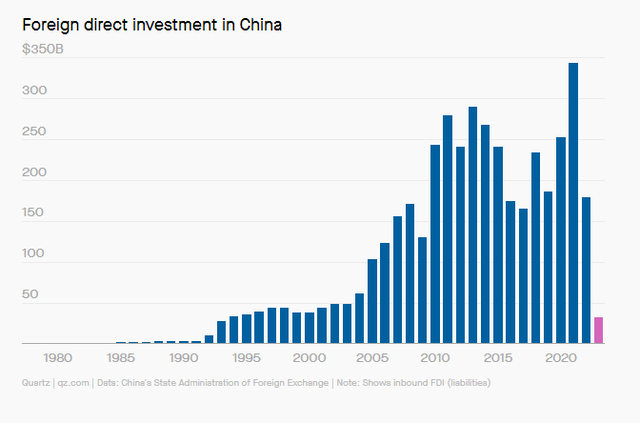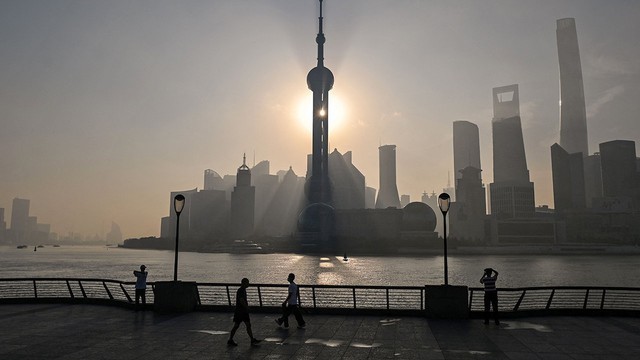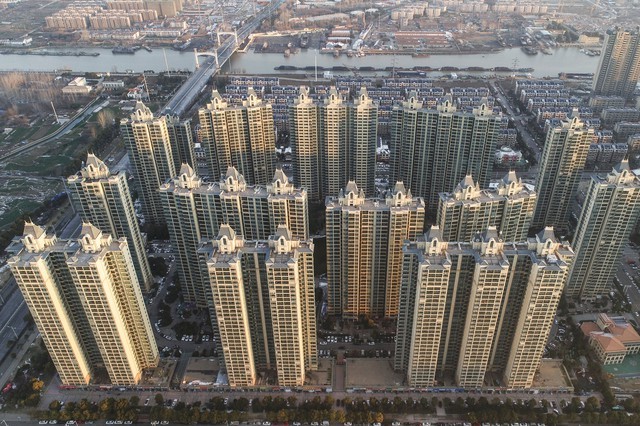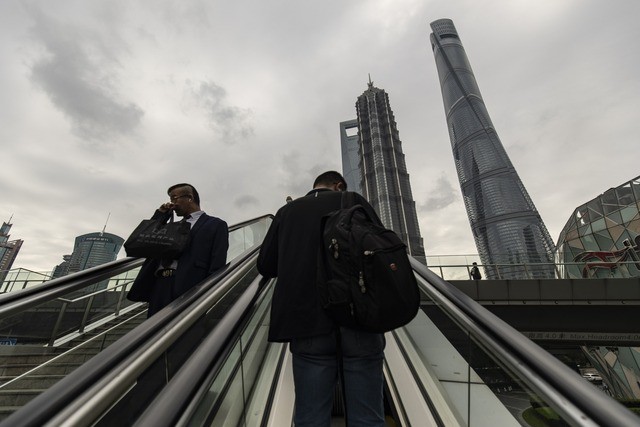FDI at 30-year Low: Asia Faces Triple Threat, Struggles to Revive Economy
Foreign Direct Investment (FDI) in China reached its lowest level in 30 years, posing new challenges for the Beijing government as it seeks to stimulate the economy with foreign capital, according to the Financial Times (FT). Data from China’s State Administration of Foreign Exchange (SAFE) shows that FDI in China last year dropped by 82% compared to 2022, reaching $33 billion. This represents a decline of more than 90% from the peak in 2021 and the lowest level since 1993.
Impact of the Pandemic and Market Recovery
Experts attribute the decline in FDI in China to the lingering effects of Covid-19 lockdown measures and the slow market recovery in 2023. Additionally, the tightening controls imposed by the Beijing government on sectors such as banking, real estate, education, technology, and credit have deterred foreign investors. The escalating trade tensions between the US and China have also contributed to the outflow of foreign investment, as investors shift their focus to other markets like Japan, which recently ended 17 years of negative interest rates and presents new growth opportunities.

SAFE’s report reveals that FDI in China experienced a decline in the third quarter of 2023, marking the first time since 1998, before showing a slight recovery in the fourth quarter. However, this alarming sign indicates that foreign investors are highly concerned about China’s economic situation.
Furthermore, the profits of foreign industrial companies in China have declined by 6.7% in 2023 compared to the previous year, according to the National Bureau of Statistics of China (NBS).
The Interest Rate Factor
Foreign investors are being lured away from China to other markets due to the higher interest rates set by central banks. For example, Japan’s decision to end its 17-year negative interest rates has attracted foreign investors. In contrast, both Europe and the US maintain relatively high interest rates without lowering them.
China, on the other hand, is reducing interest rates to stimulate its economy, which diminishes its attractiveness to international investors. A recent survey of Japanese businesses in China conducted by Bloomberg revealed that most companies are either reducing or maintaining their investments compared to the previous year due to a lack of optimism for this year.
In 2023, Japanese companies made the smallest amount of investment in China in the past decade, accounting for only 2.2% of new investments. This figure is even lower than the investment in India and only a quarter of the investment in Australia by Japanese companies.
South Korea also significantly reduced its investment in the neighboring Chinese market in 2023, with new FDI decreasing by 91% in the first nine months compared to the same period in 2022. This is the lowest level of FDI since 2002.

The CSI 300 stock index in China decreased by 11% in 2023 due to concerns about the collapse of the real estate market and the risks of companies defaulting on their debts.
Worse yet, the fallout from the real estate market is spreading to the banking sector.
The Domino Effect
The Big Four banks in China, including Industrial and Commercial Bank of China (ICBC), Bank of China (BOC), China Construction Bank (CCB), and Agricultural Bank of China (ABC), reported a total of ¥1.23 trillion ($170 billion) in bad debt for 2023, an increase of 10.3% compared to the previous year, according to Nikkei Asia Review. The risk of bad debt in China’s banking sector is rising as the rapid economic decline threatens job security and decreasing asset prices affect properties used as collateral.
Furthermore, local governments, which rely on land use fees to repay debts, are facing difficulties due to stalled projects, while many companies are facing bankruptcy.
“We are seeing risks and pressures spreading from the real estate sector, as well as companies experiencing sharp declines in the value of collateralized assets,” said Zhu Jiangtao, the risk management director at China Merchants Bank.

Chinese businesses have been heavily impacted as the real estate sector’s troubles spill over, potentially affecting consumer spending as well.
Concerns Over Deflation
While the West has grappled with inflation challenges, China is currently grappling with deflation risks as consumers refrain from spending, creating a dangerous “deflationary spiral” for the Chinese economy and negative implications for the global economy.
According to CNBC, prices in China have been declining for several consecutive months, but consumers are increasingly focused on saving money. The Consumer Price Index (CPI) in China has decreased for four consecutive months, reaching 0.8% in January 2024 – the lowest level in 15 years. Companies in almost all sectors included in the CPI basket have reduced their product prices, from cosmetics to electronics and cars. China’s Producer Price Index (PPI) has also experienced a continuous decline for 16 months, with a 2.5% drop in January compared to the same period last year.
It should be noted that although deflation reduces the profits of businesses, consumers are still reluctant to make purchases due to expectations of further price reductions or concerns about the future. This leads to continued price reductions and workforce reductions to reduce costs, thereby affecting people’s income and further pressuring consumer spending.

A recent consumer survey in China conducted by Morgan Stanley in January 2024 revealed that slightly over half of the respondents expected the economy to improve within the next six months. Approximately 76% of those surveyed have reduced their spending in at least one category over the past six months.
Furthermore, in all consumer categories, Chinese consumers tend to choose cheaper brands rather than expensive ones.
*Source: FT, Nikkei, Bloomberg
